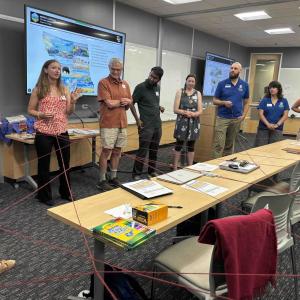Building Knowledge and Capacity Together
Date
The North Central Climate Adaptation Science Center (NC CASC) Consortium met in Boulder, Colorado, August 13-15, 2025, for a three-day workshop that blended reflection, capacity-building, and future planning. Besides a chance for gathering in-person, the workshop became a showcase of how science, Traditional Ecological Knowledge (TEK), and innovative student research and strong communication skills can come together to inform real-world climate adaptation.
The workshop opened with the Human Web icebreaker, led by Christy Miller Hesed, where participants tossed a ball of yarn to each other while introducing their work. Each throw required careful listening and making connections between projects. By the end, the yarn revealed a visible web, symbolizing how all efforts are interlinked across the Consortium.
From there, participants turned to sharpening their science communication skills. Part of this session included a “half-life your message” training, where the communications team, led by Ulyana Horodyskyj Peña, emphasized how to make research clear, concise, and memorable. Attendees found the session both engaging and practical, leaving with tools to ensure their science resonates beyond the room.
The first day closed with an Actionable Science decision-tree exercise, challenging participants to map strategies for engagement with managers and communities. The activity underscored the workshop’s central goal: making science not only rigorous, but also useful and implementable in a rapidly changing climate.
The following day, NC CASC TEK Application Specialist James Rattling Leaf, Sr. led a session on the role of Traditional Ecological Knowledge (TEK) in conservation. Participants reflected on how TEK provides enduring guidance and emphasizes ethical partnership with Tribal Nations, an essential step in climate adaptation.
Later, attention turned to the sagebrush ecosystem, a climate-sensitive biome central to wildlife, cultural heritage, and rural livelihoods in the North Central region. Students presented on ecological scenarios, invasive species resilience, and human dimensions of adaptation, while scientists worked hands-on with the draft Sagebrush Adaptation Menu, refining strategies for on-the-ground conservation.
Throughout the workshop, RCAP and CAST fellows delivered presentations on projects ranging from risk assessments for cultural heritage sites to bison sustainability, alpine greening, biodiversity management, and rural community resilience. Their work impressed participants not just for its depth, but for the clarity, speed, and accuracy with which results were communicated, which are hallmarks of actionable science.
The final day focused on strategic planning, with sessions on emerging needs, federal priorities, and opportunities for the Consortium’s next phase, led by USGS regional administrator, Molly Cross. Participants left with a renewed roadmap for the year ahead: weaving together science, TEK, communication, and student energy to strengthen adaptation strategies across the North Central region. Student blogs and detailed project reports will be published in the coming weeks, extending the reach of these insights and highlighting the voices that made this workshop a success.


